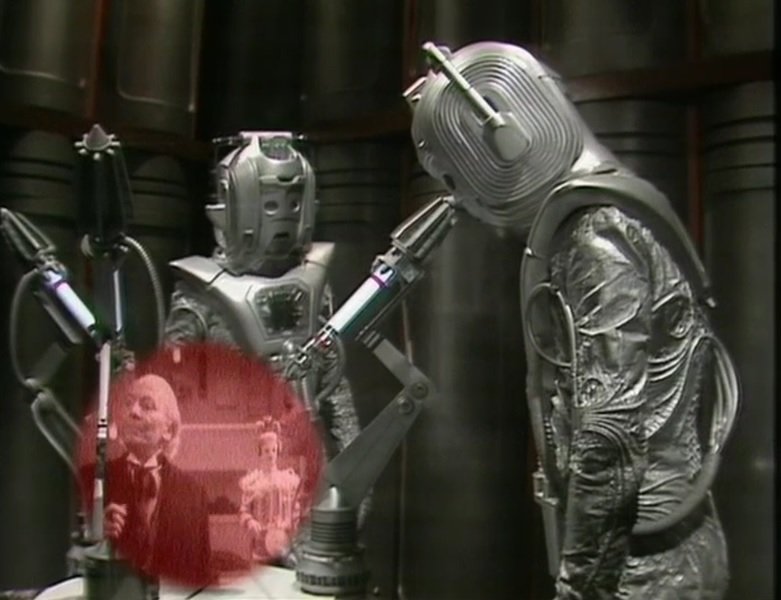Earthshock was a huge story when it was made and released in 1982. We’re now in 2024 and Earthshock is still a huge story. Not only does it bring back one of the most popular villains and arguably cemented them as one of the Doctor’s best adversaries, it also features the shocking death of one of the Doctor’s companions, something that hadn’t been done since Katarina’s death in The Daleks’ Master Plan way back in 1965.
The Target novel then, written by writer and actor Ian Marter, needs to stand up to the epic television adventure and right of the bat, Marter gives it the weighty prose it needs. Marter had already made a name for himself in the Target range for writing novels in a much more adult way and thankfully Earthshock feels like a novel that you could give to an adult and they would really enjoy it. His writing feels gritty, grim, and bloodthirsty — in many ways, he’s perfectly suited to adapt Eric Saward’s original story. It’s strange then that neither author liked the other’s work. Saward regarded the book as lazy and lacking in tension and regretted not getting to adapt the novel himself, while Marter felt incredibly restricted writing for the emotionless Cybermen.
Earthshock is easily one of Saward’s best, up there for me alongside Revelation of the Daleks, but Ian Marter deserves a lot of praise here because what Saward said was a disservice to how well the story flows. It’s tense from its opening passages and the sense of impending doom builds gradually throughout the page count up until the climactic final moments. His vivid descriptions of the Cybermen really hammer home how much of a threat they are, commenting a lot on their physical strength and I loved the passages about how they move with their respirator units and in particular how, whenever a human character gets close, they can smell a sickeningly sweet, oily vapour. I don’t think that the Cybermen have ever been described so well in any medium.
But the Cybermen are also where Marter’s tight prose comes undone. He would readily admit that he didn’t like writing for the unemotional creatures. But here they feel a little bit temperamental: the Cyber-Leader feels very angry a lot of the time while the Lieutenant likes to whine a lot. There are moments when it feels a little like a comedy rather than hard sci-fi. But, watching Earthshock, the Cyber-Leader does feel quite emotional so it’s not too out of sorts with the original material.

Luckily though, in audio format, these aspects actually feel a little less abrasive than they might do in prose. A lot of the joy of this audiobook is in hearing how the Cybermen are going to react and what they are thinking. Nicholas Briggs is on hand to do the Cybermen voices but it felt a little strange that he decided to go with the modern Cybermen voices as opposed to the ’80s ones. It feels a little disorientating at first but you do surprisingly become accustomed to them throughout the runtime — like a look into a weird parallel universe where the Lumic Cybermen faced off against the Fifth Doctor.
And the Fifth Doctor himself is on hand to narrate the story. Peter Davison does a tremendous job here, bringing the tale to life. You can tell how much he is enjoying himself: the cast have always said that Earthshock was one of their favourites to make and that enjoyment comes through in his narration. As always, he’s a delight to hear, though no one told him he’d mispronounced a name of a crew member as ‘burger’ a few times. There are also a few moments where, after the Cybermen have finished talking, there was an awkward pause before the narration continued but that is more of a sound design issue than it is a narration problem.
The story comes a little unstuck in its final moments. The original episode ends pretty abruptly with the camera closing on the crumbled remains of Adric’s star badge. Here, the novel ends pretty abruptly too with the Doctor giving a “sad smile” at his memories of his young companion. Giving what has just happened, it is a little bit of a misjudged moment but to be fair to Marter, he isn’t given much to adapt in this section so he makes the best of it he can.
Earthshock is a great television outing and a brilliant novelisation. And here on audio, it works just as well as the original — if anything it feels even more tense. But there are a few things that might feel like a distraction; in particular the different voices for the Cybermen, but that is only a minor misstep and doesn’t take away from how strong Marter’s prose is nor how good Davison is in the narration role. But ignoring these slight issues, this is a very worthwhile and hard hitting adaptation of one of the finest examples of Doctor Who.


